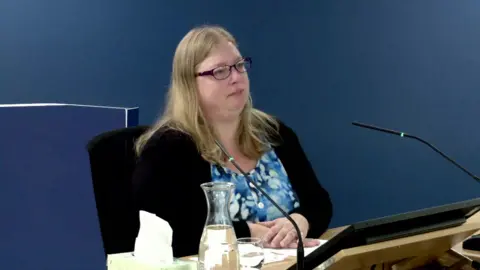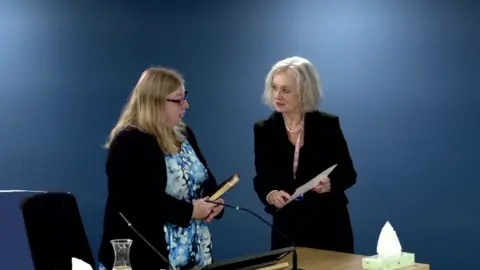 Covid Inquiry
Covid InquiryA mother of premature twins has told a coronavirus inquiry she felt she was not being treated as a parent after giving birth during the early stages of the pandemic.
Tamsin Mullen said she was kept in a side room for 27 hours after her caesarean section while her sons were admitted to the neonatal intensive care unit.
She said "strict" visiting restrictions meant only one parent would be allowed to visit her newborn baby at a time for the next month.
"We need hospitals to understand that we are a family," she told the inquest.
"We don't feel like we're the mothers and fathers of our children like we should be."
"shock"
The Covid Inquiry has been collecting evidence on the impact on maternity services as part of its third section, or module, which is investigating the impact on the NHS and healthcare.
Ms Mullen, a mother-of-three, provided first-hand evidence of the "impact" on behalf of 13 pregnancy, baby and parent organizations.
She found out she was pregnant with twin boys in 2019 and was considered high-risk. When she was pregnant with her first child, she was diagnosed with preeclampsia, a condition that causes high blood pressure and can lead to serious complications.
Her pregnancy was closely monitored with weekly scans amid concerns about the development of one of the babies.
Initially, she said her husband was able to go with her to the scan appointment, but as the coronavirus spread in March 2020, he was forced to wait outside in a parking lot after driving 50 miles from home to the nearest hospital.
“That was before the first lockdown came into effect,” she said.
"I was very nervous. Knowing (the pregnancy) was high risk, it was very difficult to do this on my own."
Ms Mullen's two sons were born prematurely via caesarean section in April 2020, at just 34 weeks.
Her husband was with her in the operating theater and then spent an hour in the recovery room before being told coronavirus restrictions meant he had to leave.
Their two little boys spent a total of 31 days in the NICU before being discharged.
Ms Mullen said coronavirus restrictions meant only one parent could be with them at a time, even if they had been moved to a single room away from other babies.
 Covid Inquiry
Covid InquiryThe hospital closed access to a side room used for breastfeeding and Ms Mullen said she was told to use the toilet to express milk but she did not want to do so due to the risk of infection.
She said the restrictions were "baffling" when the parents lived together and drove the same car to the hospital every morning.
While she was caring for two babies alone in the intensive care unit, hospital staff outside the room told her they had tested positive for the MRSA bacterial infection.
"I was holding my son who was on oxygen," she said.
"I was in shock so I didn't say anything. They (staff) left me and I was alone there.
"I didn't know what it all meant, so I was really panicking."
A doctor later explained that the MRSA in question was a less serious type that could be treated with soap and water.
"We didn't feel like we were being treated like parents. It was like we were visitors and we were visiting two patients," she said.
24/7 unlimited access
The inquiry was then questioned by Jenny Ward, chief executive of the Lullaby Trust and chair of the Pregnancy and Baby Charity Network.
Before COVID-19, most parents had unrestricted access to their young children in the NICU 24/7, she said.
The guidance will not be reinstated until April 2022 (England and Scotland) and May 2022 (Wales).
She said the decision to suspend a large number of maternity services from March 2020 had "caused huge disruption".
She added that restrictions during antenatal scans had a particularly negative impact on some women who had to accept bad news about their baby's health alone.
For much of the pandemic, pregnant women were often told that the presence of a birth partner was only allowed during so-called "active" labor.
Ms Ward told the inquest that as a result, some pregnant women were left alone in separate delivery rooms with no one else "to come to their defence, saying they appeared to be in extreme distress".
After giving birth, others have to recover from surgery in hospital while caring for their newborn baby without their partner being able to be there.
